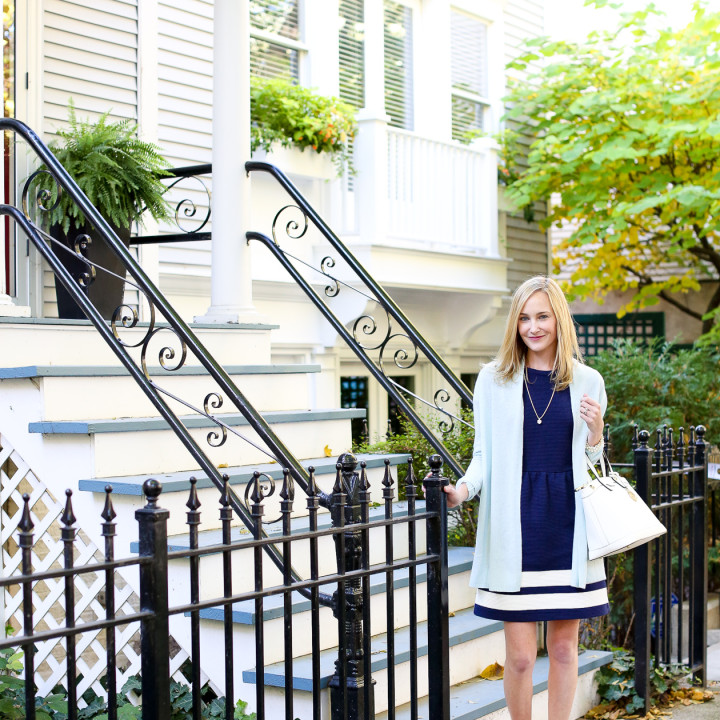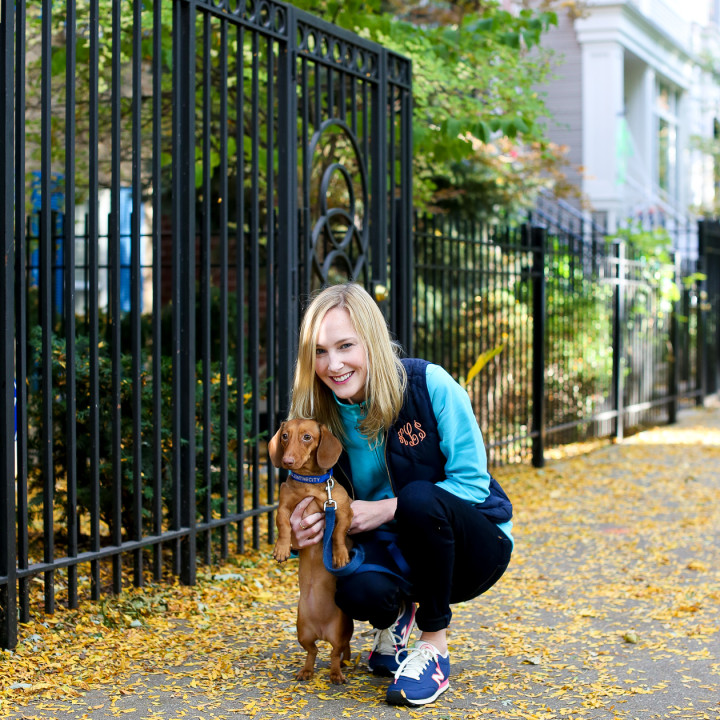
Photo from this original post.
After Kate Spade’s tragic passing earlier this summer, I wrote this post. An abridged version actually appeared first in this Instagram, but because a good number of my readers don’t use IG, I put it up on the blog, too. In the piece, I said that I’d had a blog post about my battle with depression in my “drafts” folder for years. I also promised that I’d publish it in the near future in an effort to build awareness and understanding, to remind those who are suffering privately and in solitude that they aren’t alone, and to encourage them to seek help. So here we are.
First, I should note that I’m not currently struggling with depression. I did experience a bout of it this past spring, but I’m good now. So no cause for concern! I’ve just been running this site for five years at this point (whoa), and along the way I’ve learned that I should really only blog about personal issues once I’m in a relatively good place with them. I don’t need to have totally conquered them in order to write about ’em, but publishing “Friendship Lost” in the middle of the experience, for example? Probably not the best idea for me.
While talking to and leaning on a handful of people in my life is a must, having an audience of sorts while I’m low hasn’t proven to be helpful. Instead, I prefer to blog about tough stuff once I’m mostly on the other side of it, as I’m able to think more clearly about what I’ve been through and be more reflective about it. I’m able to determine what I can take away from it all so I can learn, grow, and become a better (and happier) person… and just as importantly, I’m hopefully able to help others who might be going through something similar. This isn’t an excuse for why it’s taken me so long to publish this post; I totally wish I’d done it years ago! I suppose I just want to preface everything with this.
So what’s my story? It all started my freshman year of college, but it took me a couple of years to realize that I was depressed. I was too afraid to admit that something was going on, and I also didn’t connect the dots that there was a pattern to my reoccurring sadness.
These were rough times.
In the beginning, it was somewhat manageable. It ebbed and flowed, and somehow, I was able to hide it or disguise it as something else. School, boy problems, friends, stress–whatever. But during my junior year, things escalated so much that I was sure I was going to fail out of college. Getting myself out of bed was next to impossible, and actually going to class? Right. I woke up every day in tears, and it took everything in my power to stop the crying spells that would occur throughout the day.
I spent a lot of time crying in the shower, where no one could hear me, movie-style… and there was a constant heavy feeling in my chest, which I can only liken to the feeling I’ve had when someone’s died, as dismal as that might be. It was completely debilitating. Sometimes it was hard to breathe. I withdrew from family and friends; lost a ton of weight; no longer cared about music, reading, writing and photography; and got into a lot of arguments. Usually about me being a bad or distant friend. Logically, I knew I had so many people in my life who cared about and loved me, but I felt utterly alone and hopeless.
Finally, I reached out to my parents and told them about what was going on, and Dad jumped on Fairfield-bound train from NYC and took me to a doctor. Pretty quickly, I was diagnosed with Seasonal Affective Disorder.
At first, I was kind of like, “Okaaaay. I think I’ve heard of that. Lots of people feel down and out during the winter and wish for warmer, sunnier days. But this is NOT that. People don’t flunk out of college because of the Winter Blues. They’re not this serious.”
Yes and no. Sure, the Winter Blues are common. Nearly anyone you talk to will tell you that sometime around January or February, they start feeling sluggish, unmotivated, and generally bummed out. Cold and gloom–and an increase of melatonin and a reduction of serotonin–will do that to a person! But most people are able to get through it on their own. Unable to? That’s when we start talking about Seasonal Affective Disorder.
Seasonal Affective Disorder (SAD) is a type of depression that’s related to light. And the seasons, as the condition’s name suggests, play a big role. The idea is that a lack of daylight increases the body’s production of a chemical called melatonin, which regulates sleep and can cause symptoms of depression, and that a drop in sunlight can reduce serotonin, a brain chemical that also affects mood. SAD–ugh, worst and most fitting name ever–typically presents itself in a reoccurring pattern, too.
Most people with Seasonal Affective Disorder start feeling depressed around September or October when the days become shorter, and see improvement around April or May when the days become longer. But this isn’t the case for everyone affected (hello!), and for some, the pattern and/or duration of depressive episodes can change over time. (Yep.) And then a person’s biological clock can play a role as well. For some people (me, duh), the body senses that “winter is coming.” (Even in the summer!) And this triggers depressive episodes when you wouldn’t expect them. Still others (yours truly once again) can fail to come out of those episodes, even in the spring when the days become longer.
Seasonal Affective Disorder is usually treated by light therapy, psychotherapy or medication–or a combination of two or all three. Again, SAD manifests itself differently in people, just like all types of depression do, but some of the more serious symptoms include feelings of hopelessness; increased anxiety, extreme fatigue; insomnia or oversleeping; social withdrawal; crying spells; drastic changes in appetite or weight; hypersensitivity; a “leaden” feeling in arms and legs; irritability; and a loss of interest in activities that were once enjoyed. But I’m starting to sound like an infomercial, so I’ll stop.
Anyway, when I started seeing my doctor, we tried a combination of counseling, light therapy (where I’d sit in front of a light box for extended periods of time every day), and creating small goals for myself. While I gave it my all for a long time, we eventually determined that light and talk therapy just weren’t doing much. I ended up taking medication, and it worked. Until I’d mess it up. For years, I’d take it, start to feel better, and then go off it… only to wind up depressed again the following year. And every time, I’d wait it out as long as I possibly could–hoping it would just go away even though I knew it wouldn’t–until the situation became absolutely dire, and far more difficult to remedy.
Not sure why I did that, or why I’m still reluctant to take medication when it’s fairly obvious that it’s necessary. At one point, perhaps it was because I was ashamed, but I don’t think that’s it anymore. I mean, here I am, telling everyone I know (and tons of people I don’t) about it. Maybe it’s something I try to prove to myself? That I can get through it on my own? And if that’s the case, why do I feel the need to “get through it on my own”? It’s okay to need help. But asking for help–help with stuff outside of depression, too–can be hard. As humans, we’re designed to want to be self-sufficient. So maybe that’s it. Can you identify with this at all?
And what about the fact that I’m simply not myself when I typically have to make decisions about medication? How can I expect myself to see things clearly when I’m so sad?
The strange nature of my supposedly predictable depression likely has something to do with it, too. While SAD is characterized by a pattern, it’s always been a general pattern for me, if that makes sense. In my 20s, the sadness most often started in August… but there were a few years when I made it to November or December. Something upsetting–like a bad breakup, for example–seemed to trigger it, but then there was that one year when everything was going GREAT and it hit earlier than it ever had. As I’ve gotten older, I’ve skipped entire years altogether (!)… but I’ve also failed to come out of depressive episodes when I was expected to.
And then there’s summer. It’s just always so encouraging, and it tends to give me this inflated sense of wellbeing. “Yes! You’re feeling fantastic! You’re fine! No need for this stuff anymore.”
Going back to my story, this is precisely what happened when I graduated from college. I thought to myself, “You’re done with school! This is a new chapter! You’re good!” And boom: that fall, I was faced with yet another emergency situation, similar to the one I’d originally found myself in at Fairfield. Convinced I was about to lose my first job, I found a new doctor in New York, and went through the whole process again–but this time, I decided not to go off the medication. For good measure, I set up a light box on my desk; made an effort to get as much sunlight as possible during the day; forced myself to partake in activities when all I wanted to do was crawl under the covers; altered my diet; and ran fives miles on the reg to pump up serotonin and endorphins.
I got better.
I don’t want to make my 20s sound like a disaster. They honestly weren’t! A decade is a long time, and while I went through some hardships that most 20-somethings go through, they were, for the most part, really awesome years. In retrospect, depression played a small role, and I truly look back on them fondly. Sure, I struggled here and there, but I had a great doctor as well as an amazing family and friends, and happiness triumphed.
Things got even better when I met and fell in love with Mitch. First, I was so unbelievably happy that my symptoms became far less significant and then were largely absent. And since Mitch was almost always with me, he kind of monitored things (in a loving, non-intrusive, non-crazy way).
It’s been years since I’ve had a serious episode. I stopped taking the medication in a responsible way in my late 20s when Mitch and I started trying for kids because we didn’t want to risk anything, and I was good throughout infertility treatments, pregnancy and my first year of motherhood. Kind of amazing–and I wondered whether I’d grown out of it. My doctor said it would be difficult to determine what caused the extremely long and seemingly sudden change. Too many factors at play, from complicated ones like my situation in life to simpler ones like yes, my age. Maybe it wasn’t “sudden” at all. Maybe I’d gradually been improving for a long time.
As luck would have it, it did come back this year, though not as badly as it has in the past. I struggled with the same feelings I always seem to have about medication, but ultimately went back on it, and now I’m on the up and up. Am I at 100 percent? Meh. Probably not, if I’m being honest. But I’m good. I’m happy and enjoying life and feeling so much more like myself. I’m not depressed.
Of course, I’m still picking up the pieces from the bout. During it, I pushed away family and friends like I always do, and I damaged my business and business relationships. Over the years, though, I’ve learned that people are naturally forgiving, and most things can be fixed.
(Note: I hope you don’t think I was trying to be deceptive here on the blog during this time. On tough days, I’d simply throw up an easy outfit post or something like that. This site has always been a big positive in my life; a little escape–like how one sits down to read a book or watch a television show. :) Being cheerful here has truly translated to real-life cheerfulness. So thank you!)
Like I said before, I think depression is just something I’ll always have to deal with. But I’m no longer ashamed of it, and while it’s not my favorite topic, I try to talk about it, too. It’s a part of me. Not the biggest part, but it’s something that I accept, that I take care of, and that I know I have in common with a lot of other people. Having it has made me more empathetic, and it’s made me better understand people as a whole: that I never really know what another person might be going through. Sunny surfaces can be deceiving.
And mental illness is far more prevalent than we often perceive it to be.
This post is a bit of a rambling mess, and I’m not sure how to close without everything feeling abrupt. But I hope that this adds to the “growing discussion about the need to address mental health issues,” to borrow the NYT’s words. Mental health needs to be on our minds far more than it already is. It’s not enough to talk about it and say “hey, me too!” only when the world loses great people.
It’s too late then.
I also hope this post serves as a reminder that you are not alone. Talk to a family member, a friend, an acquaintance, an online confidant–anyone–and tell them what’s going on. And if all becomes too much, reach out here.














